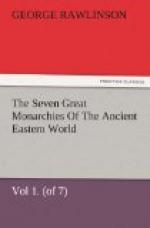’To the gods, with a prayer that it might fare
well with mankind.’ Then Xisuthrus was
not disobedient to the vision, but built a ship five
furlongs (3125 feet) in length, and two furlongs (1250
feet) in breadth; and collected all that had been
commanded him, and put his wife and children and close
friends on board. The flood came; and as soon
as it ceased, Xisuthrus let loose some birds, which,
finding neither food nor a place where they could
rest, came back to the ark. After some days
he again sent out the birds, which again returned to
the ark, but with feet covered with mud. Sent
out a third time, the birds returned no more, and
Xisuthrus knew that land had reappeared: so he
removed some of the covering of the ark, and looked,
and behold! the vessel had grounded on a mountain.
Then Xisuthrus went forth with his wife and his daughter,
and his pilot, and fell down and worshipped the earth,
and built an altar, and offered sacrifice to the gods;
after which he disappeared from sight, together with
those who had accompanied him. They who had
remained in the ark and not gone forth with Xisuthrus,
now left it and searched for him, and shouted out
his name; but Xisuthrus was not seen any more.
Only his voice answered them out of the air, saying,
’Worship God; for because I worshipped God,
am I gone to dwell with the gods; and they who were
with me have shared the same honor.’ And
he bade them return to Babylon, and recover the writings
buried at Sippara, and make them known among men;
and he told them that the land in which they then
were was Armenia. So they, when they had heard
all, sacrificed to the gods and went their way on
foot to Babylon, and, having reached it, recovered
the buried writings from Sippara, and built many cities
and temples, and restored Babylon. Some portion
of the ark still continues in Armenia, in the Gordiaean
(Kurdish) Mountains; and persons scrape off the bitumen
from it to bring away, and this they use as a remedy
to avert misfortunes.”
“The earth was still of one language, when the
primitive men, who were proud of their strength and
stature, and despised the gods as their inferiors,
erected a tower of vast height, in order than they
might mount to heaven. And the tower was now
near to heaven, when the gods (or God) caused the
winds to blow and overturned the structure upon the
men, and made them speak with divers tongues; wherefore
the city was called Babylon.”
Here again we have a harmony with Scripture of the
most remarkable kind—a harmony not confined
to the main facts, but reaching even to the minuter
points, and one which is altogether most curious and
interesting. The Babylonians have not only, in
common with the great majority of nations, handed
down from age to age the general tradition of the Flood,
but they are acquainted with most of the particulars
of the occurrence. They know of the divine warning
to a single man, the direction to construct a huge
ship or ark, the command to take into it a chosen few




